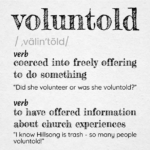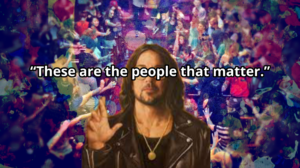I was already on my way out, but the brown little Black girl was the final straw. Well, one of the first final straws. It has been over two years now and I have gone on to go much farther in leaving church than I would have ever thought possible. But that’s a story for a different day. Anyway, we were standing outside the venue where church was being held that week. It was before service and after service, so I was coming or going or staying, I don’t know. Doesn’t matter. It’s all the same. Anyway, two kids were playing. A brother and sister. Running around and jostling each other, the way kids do before and/or after church, but you know the saying: It’s all fun and games until somebody messes up somebody’s hair. So when the younger brother reached out to mess up his older sister’s hair, the game came to a sudden stop. And as Big Sister turned her attention to fixing what Little Brother had done, I turned to Little Brother with a laughing, but real reminder: “Come on man, you know better — you never touch a black woman’s hair.”
“NOT BLACK!” The words were fast and panicked. And Big Sister was upset. With me. Her brother completely forgotten as she turned her full focus on correcting me. “I’m brown! My hair is brown! Brown. Not black.” And after years of instigating and being part of “diversity” conversations that culminated with leadership favoring “organic” change over making intentional choices, when I looked at her, this brown little Black girl, so upset over a cultural joke she misheard, distraught at the thought that something brown would be called Black, and already heavy with a burden I recognized from working so hard to be rid of, I knew I had to go.
To be completely fair and clear: the church I was part of did not cause that little Black girl’s discomfort with being associated with Black. That need to draw a distinction between brown and black, that automatic aversion to Black as a descriptor — that’s the signature work of America. That church did not do that. But there was nothing about that church that was undoing it. Based on what types of people were (and were not) consistently deemed worthy of being seen, heard and followed, the messages I had to sort through about myself, my worth, my purpose as a Black Christian in church weren’t any different than the ones I faced as a Black American in the secular world. And with a healthy dose of Trump voters on staff, that church definitely wasn’t helping me feel any safer or more hopeful about America in general. In the fight for equality, there was no rest for the weary, no sanctuary in that particular sanctuary. And as someone I used to know, used to be fond of saying “If you ain’t helping, you ain’t helping.” And for all it’s posturing, that church wasn’t helping.
Representation matters. Where we see people and what we see them doing matters. And when we get used to seeing certain types of people in certain types of positions, it matters. We subconsciously begin to not only associate, but disassociate certain traits, strengths and status with certain demographics. I remember bringing a white male friend to that church for the first time and the speaker that day was not just a white male (zero surprise there) but happened to be one that happened to look very much like him. It was his first day and he could already (literally) see himself in leadership. Imagine that. No seriously, women and people of color (and especially women of color!) — you better imagine that. Because your actual glimpses of it are going to be few and far between (specifically sometime during Black History Month, Mother’s Day and immediately before/after the women’s conference).
And why is that? The first stab I ever took at addressing the diversity-slash-representation topic was two or three years in, after a mid-week service when a brand new white boy was unveiled as a new associate pastor. He was the MC for the evening. And he was bad. So bad. So so bad. Like seriously, and I cannot stress this enough: bad. So I texted the lead pastor… “Hey, next time the roster opens up, howsabout we slide a woman and/or a person of color in there??” and his response was… agreeable? “I’d love that! So let’s pray for God to send one!” Send one? I remember looking around, at a crowd heavy with women and people of color, and wondering how not one of us was sent…
And that’s where this all this “representation” talk gets super dicey, super messy and super important, super fast. Because when Christian leaders couch their leadership choices as God’s will, God’s revelation, God’s choice — they make harmful assertions about God. Riddle me this: When it comes time for this all-knowing, far-reaching, wild, redemptive and unpredictably creative God, who created such a wild, varied and colorful array of humanity, to choose someone to represent Him; why would He continuously makes the same standard, uninteresting and predictable choice? It’s a real puzzler. And very troublesome. Which is why we need to start calling it exactly what it is…
Conversations about diversity are awkward and often difficult; and as marginalized people trying to coax often reluctant leaders to engage in awkward and difficult exchanges, we have had to learn how to cushion all the blows: being overly appreciative of any little effort, allowing for certain false equivalencies, overlooking boundary oversteps and softening language. So when we address issues of diversity in leadership, we tend the name the problem as gently as possible, and always as something that is a struggle for us that we need the powers-that-be to assist with .
Let’s talk about how you (well-intentioned leader) can help us (disappointed minority) with the lack of diversity.
Thank you (champion among men) for being willing to hear us (needy women) re: our issue of under-representation.
Bless you (white savior) for being willing to explore solutions to our (complaining Blacks) lack of representation.
but what if we started calling it what it actually is:
Misrepresentation
noun
the action or offense of giving a false or misleading account of the nature of something.
Leadership teams, church staffs, pastoral rotations and church boards that consist primarily of white men are misrepresentations. They give a false and misleading account of the importance, ability and significance of white men. Of women. Of people of color. Of women of color. Of everyone. And worse: they give a false and misleading account of the nature of God. Of God’s will and of God’s all-knowing, far-reaching, wild, redemptive and unpredictable heart. And misrepresentation is always harmful. For everyone involved. Even you, White Male. With your restricted view of who God can use, coupled with your colossal (colonial) mandate to lead people in God’s will, which almost always seems to be the call of someone who looks/thinks/lives like you… how can you not be a bit of a self-important monster? Favor ain’t fair, amiright? So why should you be? And why shouldn’t you congratulate yourself (and be congratulated!) for just being willing to humor conversations about how you can help the under-represented?
But what if… Here’s an interesting humble thought experiment: What if we (the long-suffering marginalized) have actually been sent to help you (over-represented demographic) give up some of your power? It’s hard work – giving up power- but somebody’s gotta do it… and you, white male, literally can not. No offense, but you just don’t have the range.
But honestly, and unfortunately, neither do a large number of your followers. Years and years of misrepresentation have done their job. And we (everyone/anyone who is not you) has gotten so used to seeing you lifted as the standard, our own imaginations and expectations have been stunted. We’ve settled into accepting the way things are as the way they’re supposed to be. And we credit every minor concession as a revolution, because we’re not completely convinced the God we believe in, believes in us.
But God does. So much so, that They has left it up to us to make “thy Kingdom come, thy will be done on Earth as it is in Heaven.” So we each have to do the hard work of taking stock of the spaces we occupy and asking ourselves: Is this as it is in Heaven? And when it’s not, we have to speak up. Speak truth to power. Speak truth in love. Speak. And when the time comes, step out. Of our comfort zones. Of line. Of places that foster misrepresentation. For others. For ourselves. For God’s sake. And for all the brown little Black girls who need spaces that see them and show them differently; churches that actually reflect Heaven instead of mirroring America. Because it’s not going to happen without intentional and sustained effort; and if you ain’t helping, you ain’t helping.




